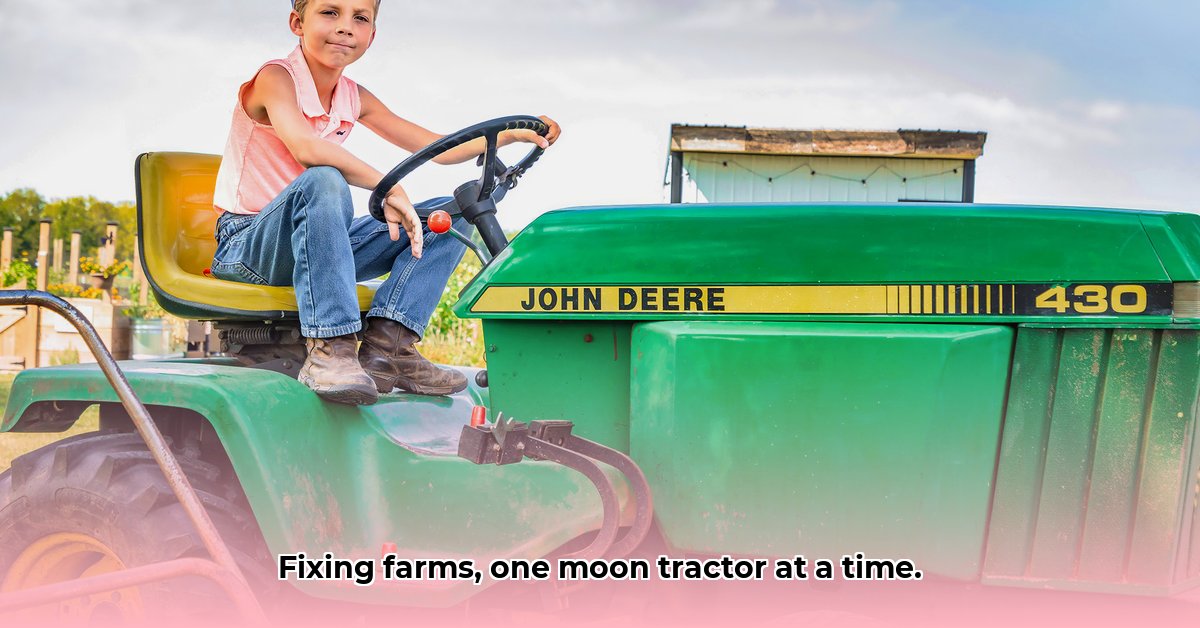
A Legacy of Repair: Cultivating Sustainable Agriculture in Ohio
Moon Tractor Co., a family-run business operating in Ohio for over 75 years, stands as a testament to the enduring importance of reliable farm equipment repair. More than just a sales and repair shop, Moon Tractor Co. is actively contributing to a more sustainable agricultural future by extending the lifespan of existing machinery. This case study examines their operations, exploring how their commitment to repair services reduces waste, minimizes environmental impact, and addresses the growing need for sustainable practices in modern farming. For another Ohio tractor supplier, check out this link.
More Than Just Mechanics: A History of Service and Innovation
Since 1949, the Moon family has been at the heart of Ohio's farming community. Their commitment extends beyond simply selling new and used equipment (including brands like Ford, Kioti, and Toro). Moon Tractor Co. provides crucial repair services, keeping vital farm machinery operational for years beyond its typical lifespan. This longevity is a significant factor in promoting sustainability—reducing the need for constant new equipment purchases and the associated manufacturing waste and emissions. This approach challenges the prevailing "buy, use, discard" cycle typical of modern consumerism, offering a practical and impactful approach to environmental stewardship.
Sustainable Practices: Extending Equipment Lifespan and Reducing Waste
Moon Tractor Co.'s core business model is inherently sustainable. By expertly repairing and maintaining a wide range of farm equipment, they significantly reduce resource consumption, lessen the environmental impact of agricultural operations, and actively combat wasteful disposal practices. This repair-centric approach reduces the demand for new equipment, leading to lower manufacturing emissions and the preservation of precious resources. However, opportunities for further improvement exist. Sources for replacement parts could explore more eco-friendly materials, and implementing more efficient waste-management systems for used oils and other hazardous materials would strengthen their sustainability profile. Investing in employee training focused on environmentally conscious techniques would yield significant long-term benefits. Considering opportunities for green technology integration during equipment repairs—such as emissions reduction technologies or energy-efficiency improvements—would solidify their commitment even further. Are these improvements cost-effective? A detailed cost-benefit analysis should be undertaken to determine the return on such investments.
Navigating Market Trends: Adapting to a Changing Agricultural Landscape
The agricultural equipment market is dynamic. Farmers increasingly seek fuel-efficient and technologically advanced machinery, demanding adaptation and innovation from companies like Moon Tractor Co. A major opportunity lies in retrofitting older equipment with modern, energy-saving technologies. This would extend the lifespan of existing machinery while enhancing sustainability. Furthermore, exploring alternative fuels or partnering with agricultural technology companies to integrate innovative solutions into repair services would strengthen their market position and reinforce their commitment to sustainable practices. The company’s ability to adapt will ultimately determine its long-term success and influence within the broader context of sustainability in farming. How effectively can Moon Tractor Co. integrate emerging technologies to meet farmers' evolving needs while maintaining their focus on repair?
Actionable Recommendations for a Greener Future
To further promote sustainable agriculture, collaboration across various stakeholders is crucial. This requires a multi-faceted approach encompassing immediate actions and long-term strategies:
Moon Tractor Co.: Implement a parts inventory featuring environmentally friendly options; conduct regular employee training on eco-conscious repair techniques. Long-term goals include transitioning to a fully sustainable parts supply chain; integrating cutting-edge green technologies into repair services; and exploring carbon-neutral operational strategies.
Local Farmers: Prioritize regular equipment maintenance; adopt conservation tillage and other sustainable farming techniques. Long-term goals include partnering with Moon Tractor Co. on pilot programs using retrofitted equipment; participating in workshops on sustainable agriculture best practices.
Agricultural Supply Chains: Promote sourcing eco-friendly manufacturing materials & parts; support sustainable manufacturing practices. Long-term goals include developing industry-wide standards and certifications for sustainable equipment and parts; incentivizing the use of refurbished machinery.
Government & NGOs: Offer financial incentives for sustainable equipment upgrades and repairs; support research and development in sustainable agricultural technologies. Long-term goals involve implementing policies promoting sustainable farming practices; creating regulatory frameworks that incentivize the use of sustainable equipment and encourage responsible disposal of old machinery.
Conclusion: A Sustainable Legacy for Ohio Agriculture
Moon Tractor Co.'s journey reflects the evolving needs of sustainable agriculture. Their model of repair and maintenance demonstrates the potential of extending the lifespan of existing equipment, thereby reducing waste and optimizing resource utilization. While their current practices embody sustainability, proactive adoption of environmentally conscious strategies, combined with strategic partnerships, will ensure their continued success and solidify their contribution to a greener agricultural future for generations to come. Their legacy will be defined not only by their repair expertise but by their commitment to creating a more sustainable farming ecosystem in Ohio.